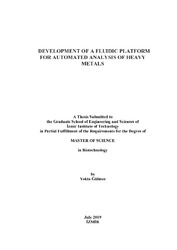Please use this identifier to cite or link to this item:
https://hdl.handle.net/11147/7327| Title: | Development of a Fluidic Platform for Automated Analysis of Heavy Metals | Other Titles: | Ağır Metallerin Analizi için Otomatikleştirilmiş Bir Akışkan Platformun Geliştirilmesi | Authors: | Gülmez, Yekta | Advisors: | Tekin, Hüseyin Cumhur Bulmuş, Volga |
Keywords: | Heavy metals Arsenic Arsenic detection Determination of arsenic |
Publisher: | Izmir Institute of Technology | Source: | Gülmez, Y. (2019). Development of a fluidic platform for automated analysis of heavy metals. Unpublished master's thesis, İzmir Institute of Technology, İzmir, Turkey | Abstract: | Heavy metals are part of Earth’s crust and the significant problem is accumulation of
them in the ground waters. They have harmful results to body even they are at low
concentration. Arsenic is one of the heavy metals which cause serious health problems
such as; cancer, diabetes etc. Most of the developing countries are lack of detecting
arsenic amount into drinking water. Therefore, especially in Bangladesh 1 out of 100
people die due to arsenic related cancer. According to World Health Organization, the
maximum arsenic concentration in the drinking water must be 10 μg/L but the
concentration amount reaches 50 μg/L or more at the developing countries. However,
existing methods cannot detect arsenic at this range or the ones that can detect arsenic at
the standard have so high prices that developing countries cannot afford. Therefore, the
aim of this project is to develop a device for arsenic detection. In this thesis, a microfluidic
chip was developed, and gold nanoparticles was used to detect arsenic in samples using
absorbance spectroscopy. The detection principle was designed based absorption of
arsenic and then gold on thiol-modified surfaces. The different concentration of arsenic
samples was injected into microfluidic chip and 1.3 mg/L arsenic concentration could be
detected. Then, syringe pump was added to the system and flow applied. As a result, the
developed microfluidic chip is able to detect arsenic at 2.2 μg/L. Ağır metaller, dünya kabuğunun bir parçasıdır ve yeraltı sularında birikmeleri önemli bir problem haline gelmiştir. Düşük konsantrasyonlarında bile vücutta ciddi zararlı sonuçları vardır. Arsenik de ciddi sağlık sorunlarına neden olan ağır metallerden biridir örneğin; kanser, diyabet vb. Gelişmekte olan ülkelerin çoğunda arsenik miktarının içme suyundaki tespiti yetersizdir. Bu nedenle, özellikle Bangladeş'te 100 kişiden 1'i arsenik kaynaklı kanser nedeniyle ölmektedir. Dünya Sağlık Örgütü'ne göre, içme suyunda maksimum arsenik konsantrasyonu 10 μg / L olmalıdır ancak gelişmekte olan ülkelerde bu miktar 50 μg/L ve üzerine çıkmaktadır. Bununla birlikte, mevcut yöntemler bu aralıkta arsenik tespit edememektedir veya standartta arsenik tespit edebilenler, gelişmekte olan ülkelerin karşılayamayacağı kadar yüksek fiyatlara sahiptir. Bu nedenle, bu projenin amacı arsenik tespiti için bir cihaz geliştirmektir. Bu projede, bir mikroakışkan çip geliştirildi ve metalik özelliklerinden dolayı sonuç elde etmek için altın nanoparçacıklar kullanıldı. İlke, As-S bağı ve Au-S bağı temel alınarak tasarlanmıştır. Farklı arsenik örneklerinin konsantrasyonu mikroakışkan çipin içine enjekte edildi ve 1.3 mg/L arsenik konsantrasyonu tespit edilebildi. Daha sonra sisteme şırınga pompası eklendi ve akış uygulandı. Sonuç olarak, geliştirilen mikroakışkan çip, 2.2 μg / L'de arsenik tespit edebiliyor. |
Description: | Thesis (Master)--Izmir Institute of Technology, Biotechnology, Izmir, 2019 Full text release delayed at author's request until 2022.02.17 Includes bibliographical references (leaves: 47-55) Text in English; Abstract: Turkish and English |
URI: | https://hdl.handle.net/11147/7327 |
| Appears in Collections: | Master Degree / Yüksek Lisans Tezleri |
Files in This Item:
| File | Description | Size | Format | |
|---|---|---|---|---|
| 10176671.pdf | MasterThesis | 5.15 MB | Adobe PDF |  View/Open |
CORE Recommender
Page view(s)
246
checked on Mar 31, 2025
Download(s)
122
checked on Mar 31, 2025
Google ScholarTM
Check
Items in GCRIS Repository are protected by copyright, with all rights reserved, unless otherwise indicated.